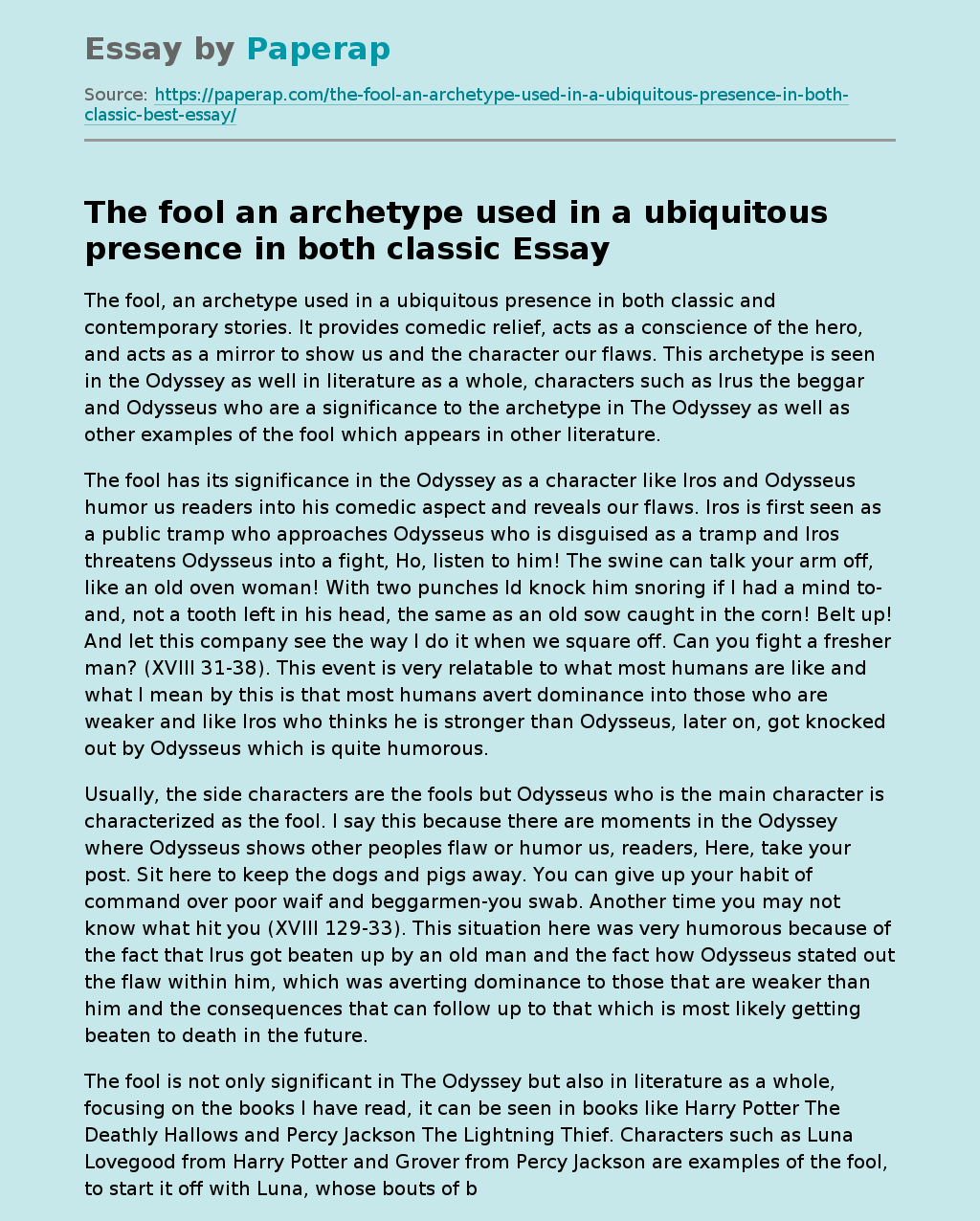The fool an archetype used in a ubiquitous presence in both classic
The fool, an archetype used in a ubiquitous presence in both classic and contemporary stories. It provides comedic relief, acts as a conscience of the hero, and acts as a mirror to show us and the character our flaws. This archetype is seen in the Odyssey as well in literature as a whole, characters such as Irus the beggar and Odysseus who are a significance to the archetype in The Odyssey as well as other examples of the fool which appears in other literature.
The fool has its significance in the Odyssey as a character like Iros and Odysseus humor us readers into his comedic aspect and reveals our flaws. Iros is first seen as a public tramp who approaches Odysseus who is disguised as a tramp and Iros threatens Odysseus into a fight, Ho, listen to him! The swine can talk your arm off, like an old oven woman! With two punches Id knock him snoring if I had a mind to-and, not a tooth left in his head, the same as an old sow caught in the corn! Belt up! And let this company see the way I do it when we square off.
Can you fight a fresher man? (XVIII 31-38). This event is very relatable to what most humans are like and what I mean by this is that most humans avert dominance into those who are weaker and like Iros who thinks he is stronger than Odysseus, later on, got knocked out by Odysseus which is quite humorous.
Usually, the side characters are the fools but Odysseus who is the main character is characterized as the fool. I say this because there are moments in the Odyssey where Odysseus shows other peoples flaw or humor us, readers, Here, take your post. Sit here to keep the dogs and pigs away. You can give up your habit of command over poor waif and beggarmen-you swab. Another time you may not know what hit you (XVIII 129-33). This situation here was very humorous because of the fact that Irus got beaten up by an old man and the fact how Odysseus stated out the flaw within him, which was averting dominance to those that are weaker than him and the consequences that can follow up to that which is most likely getting beaten to death in the future.
The fool is not only significant in The Odyssey but also in literature as a whole, focusing on the books I have read, it can be seen in books like Harry Potter The Deathly Hallows and Percy Jackson The Lightning Thief. Characters such as Luna Lovegood from Harry Potter and Grover from Percy Jackson are examples of the fool, to start it off with Luna, whose bouts of both whimsy and honesty may not be admired by her peers, but prove to be admirable all the same. Lunas oddly funny behavior and her confidence label her the literal fool, but also since Lunas hand in comic relief tend to be unintentional on her part and funny to her peers and to the readers because of the pure ridiculousness of it. Not only that but Luna is balanced by her astute observation of society as well as those who live it in which is a useful talent considering of how honest she is and how she would bluntly say the truth and by her disregard of social norms, she is quick to determine and dissect characters. Example of this would be when Harry Potter, the main character, during Bill and Fleurs wedding he has assumed a false identity under the influence of Polyjuice Potion for his and others safety and in spite of that, Luna, who isnt privy with information was able to identify him which surprised him.
In the Percy Jackson series especially the first book The Lightning Thief, Percys best friend Grover is characterized as the archetype of the fool because of how he is always making jokes that make everyone laugh. Not only that but Grover is known for watching out for Percy and Annabeth throughout their mission from likely danger, for example the situation where someone had to stay behind so that Percy can escape with his mother so Grover stayed behind so Percy, Percys mother, and Annabeth can get to Olympus in time before the world ends which shows how much Grover cared for his friends. All of these acts Grover has done all points toward to that he is what is characterized as the fool, he proved himself a sidekick in his own right and because of this Grover is usually not taken seriously but has the freedom to speak his minds without the worry of others opinion. He had nothing to lose, a fact thats to his benefit, by doing this his challenge was to teach the hero, Percy, this lesson.
The fool is widely found in many works of literature around time, it is important because the fool are usually the ones in which the main character listens to and the fool in some literature expose the main characters flaws to have an epic transgression toward change into the good or bad and have a dramatic way of transforming storytelling. The nature of the fool provided honesty and insight, creativity and change, and the joy that comes with it. Not only do fools make stories interesting to read but it educates us in what humans can be like, but it not only encourages the hero to live freely as they do but the readers as well.
The fool an archetype used in a ubiquitous presence in both classic. (2019, Dec 07). Retrieved from https://paperap.com/the-fool-an-archetype-used-in-a-ubiquitous-presence-in-both-classic-best-essay/

